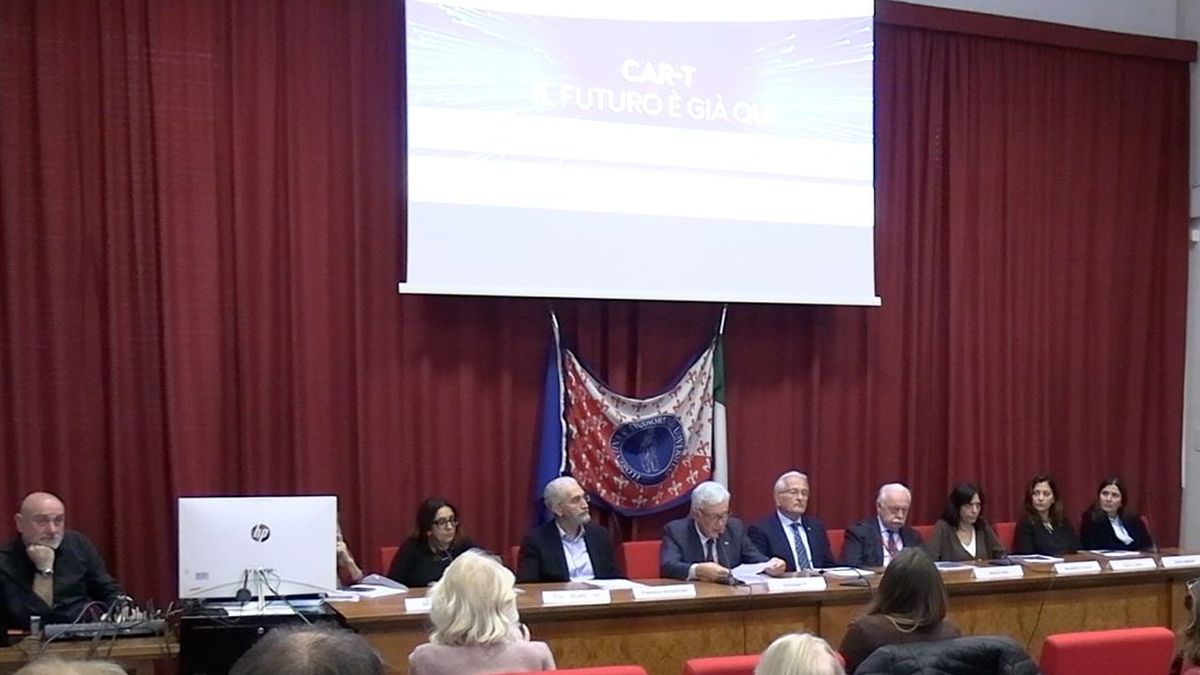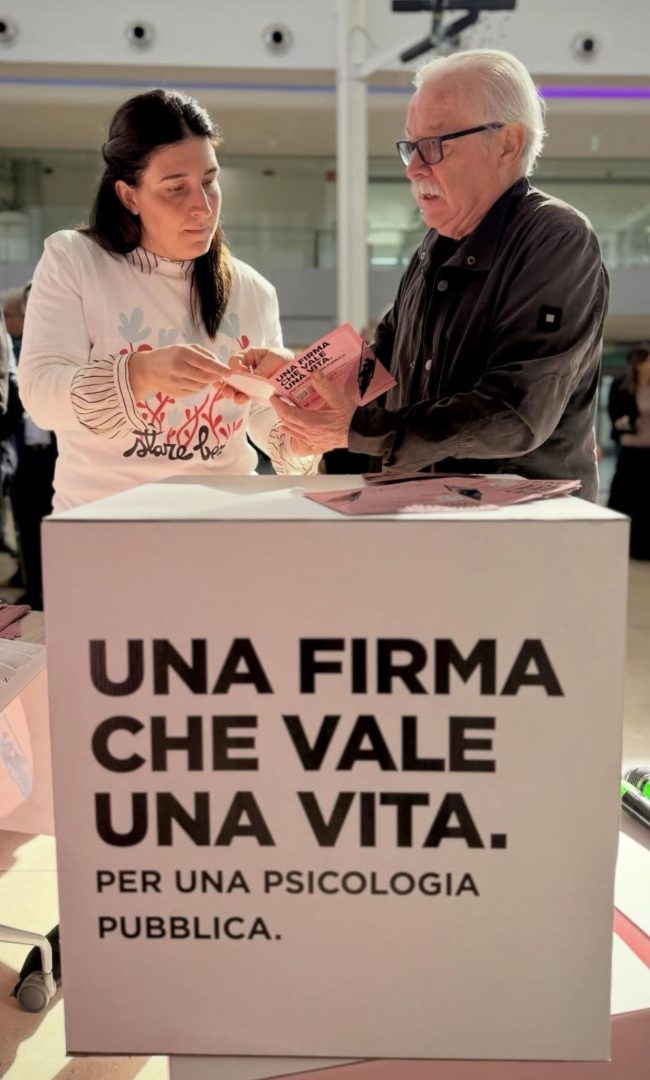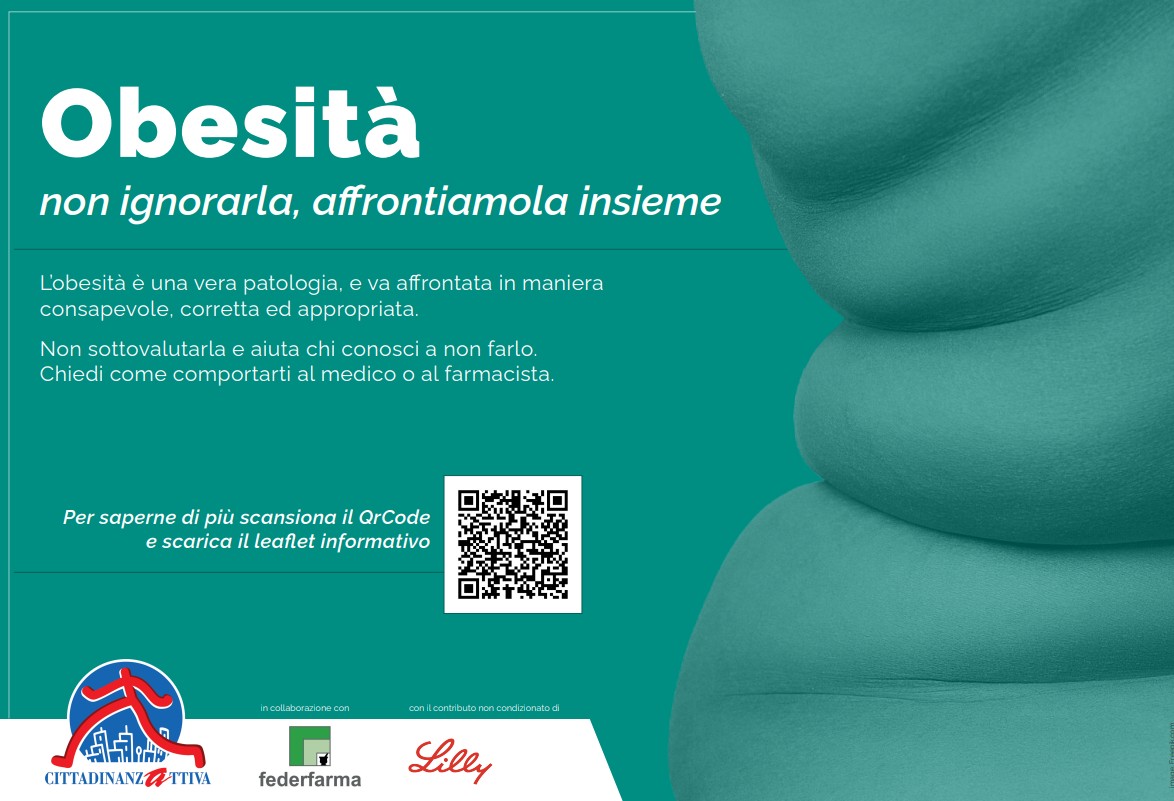FIRENZE (ITALPRESS) – More than 6 years after the arrival in Italy of the first anti-cancer gene therapy, CAR-T (acronym of Chimeric Antigens Receptor T-Cells), advanced therapies based on the modification and strengthening of T lymphocytes, which in this way manage to recognize and attack cancer cells, are now a very present and used clinical reality in Italian practice. The CAR-T as we know them today are only the first step on a journey in profound evolution, and still many are the questions to which to give answers. In this perspective AIL – Italian Association against Leucemie, lymphoma and myeloma has decided to continue the ‘viaggiò di CAR-T – The future is already here, with the stage of Florence. The meeting was introduced by the institutional greetings of Dr. Nicola Paulesu, Deleghe Councillor in Welfare, Reception and Integration of the City of Florence. The itinerant and online campaign was founded in 2021, to inform patients, family, caregiver and specialists, and to improve knowledge, access and management of treatments, with a look at the clinical experiences matured, the successes of treated patients and future application areas. “The arrival of CAR-T in Italy has been expected for a long time, and when these therapies have finally become available they have generated many expectations and questions. AIL immediately felt the need to go into the field with a clear and correct information: the campaign “CAR-T – Destination Future” was born, conceived with the aim of education on these innovative mobile therapies – says Giuseppe Toro, National President AIL – The first edition of the campaign reached 10 Italian regions with 11 stages from north to south of the country, thanks to the support of the local sections AIL. But AIL is aware that the journey in the future Although there are still many challenges to face for research and clinical and some important questions to give answers, CAR-Ts are more than a concrete hope for those patients who do not respond to conventional therapies, and their use is getting unexpected successes until a few years ago in patients who no longer had any therapeutic chance. In this scenario, exciting and constantly evolving, AIL is determined to stay alongside patients and families and wants to continue to promote information as comprehensive and correct as possible that is able to help patients and doctors themselves towards safer and effective therapeutic choices”. CAR-T represents the great revolution that is changing therapeutic scenarios in the fight against blood cancer, and not only. The 12-year budget of studies is outstanding and the research goes faster and faster: in Italy there are 5 CAR-T approved on 6 approved in Europe, and with indications increasing in adult and child. In Italy until now, 1,500 and 1,800 patients were treated: Many, considering that the first administration dates back to 2019 and that for a long time only one Center (at the National Institute of Tumors of Milan) was authorized to carry out these treatments. Currently there are about 44 centers enabled on the national territory. « CAR-T cells fall within the category of advanced therapies: This is targeted therapies, specific for a precise receptor and highly customized – says Alessandro Maria Vannucchi, Professor of Ematology, Director SOD Ematology, Director of Oncology Department AOU Careggi, University of Florence Studies, President SIES – Italian Society of Experimental Hematology – The term CAR-T indicates an immunotherapy that uses T lymphocytes, a subpopulation of white cancer cells. T lymphocytes taken from the patient are subsequently engineered, i.e. genetically modified through a procedure leading to the construction of the so-called CAR, a chimeric receptor able to recognize the target expressed on the surface of cancer cells. At this point engineered T lymphocytes are refuted into the same patient and are able to recognize the target to be eliminated. CAR-T therapies currently reimbursed in Italy are used for some leukemias, such as acute lymphoblastic leukemia, for some aggressive lymphomas such as B large cell lymphoma, mantellar lymphoma and follicular lymphoma and recently in the Multiplo Mieloma. The indications are different depending on the disease stage, the treatment lines previously performed, the age and fitness of the patient». Increasing the number of patients with CAR-T treated lymphoma and increasing effectiveness and safety, while reducing toxicity. «In our immune system there is a class of cells, called T lymphocytes, which have the task of destroying everything that is foreign to our body. In practice T lymphocytes are the main weapon that can be used against tumors, since neoplastic cells have peculiar characteristics that make them extraneous to the organism and attackable by T lymphocytes – explains Monica Bocchia, Ordinary Professor of Hematology, Department of Medical Sciences, Surgery and Neurosciences, University of Siena; Director UOC Emathology, AOU Siena – The first step towards this strategy was the development of monoclonal antibodies that bind to specific targets (antigens) present on the surface of cancer cells. Over the years, it has succeeded in making monoclonal antibodies increasingly efficient until the development of bi-specific monoclonal antibodies, another revolution of immunotherapy. Finally, after years of research, the so-called monoclonal checkpoint inhibitors antibodies were developed. Last but not least, the CAR-T, followed by the development of more innovative therapies that are coming: medicines that can specifically inhibit a certain mutated gene, specific and targeted drugs that do not destroy the leukic cell, but through gene inhibition promote its differentiation and normal maturation. A new hope in older and fragile patients as they are less toxic drugs than chemotherapy”. CAR-T cells are an outstanding translational research model in blood cancer, and are among the most innovative therapies available today. «That T cells were an extremely powerful weapon has been known for decades but the possibility of being able to use them effectively against cancer cells has been realized thanks to the technologies of bioengineering and genetic engineering that have allowed to change the mode with which the T cell recognizes the target, through the chimeric receptor CAR and to reproduce its expression on the totality of T cells engineered – says Francesco Annunziato, Professor Ordinary of General Pathology, Director This phase required years of basic research in phase I, II and III clinical trials. Now the goal is to improve this biological drug: we are trying to understand through the application of cell therapy on the patient as this ‘pharmaceutical can be improved. We know that it is an extremely effective approach, yet not all patients find benefit from therapy and in some cases, in the face of an effective initial response, then they fall back into the disease. It will be important to understand why some patients do not respond adequately or why in some of them the disease is reborn. This process of knowledge is defined as ‘reverse translation’, i.e. starting from the base to get to a clinical application, then the clinical application is observed to understand how to try to improve the CAR-T cell. This process accelerates the development of new treatments and improves those already available. Today we are at the fourth generation of CAR-T cells with the last two, modified to improve its effectiveness and duration in vivo, still in phase of experimentation”. The surprising results obtained in the Multiple Myeloma reflect the consistent effectiveness of CAR-Tifying therapy, which through the use of the patient’s immune system is able to overcome the mechanisms of resistance of cancer cells to conventional drugs, and emphasize how it is able to bridge, even if not completely, an unsatisfactory clinical need of patients with a very unfavorable prognosis. Today, with CAR-T, survival can exceed 2-3 years, with cases of prolonged remission and MRD negativity. It is necessary, however, a new organizational approach to taking care of these patients who must be multidisciplinary (hematologists, cardiologists, intensive, neurologists, hospital pharmacists) and for the structures that administer these CAR-Ts, patients must be managed in accredited centers for cellular manipulation and management of specific toxicity (CRS, ICANS). After infusion, it is mandatory to switch from intensive follow up to long-term surveillance, with monitoring of minimal residual disease and late toxicity”. CAR-T therapies are also demonstrating important in lymphoproliferative diseases for which they have profoundly changed the therapeutic scenario, especially lymphomas, offering patients new perspectives of care in situations that, until recently, had very unfavorable prognosis. In Italy, at 2025, these therapies are available for some lymphoma subtypes and at different therapeutic moments, depending on the type of disease and the response to previous therapies. “A few CAR-T patients can already be used from the second line of treatment, others from the third or fourth line, configuring a therapeutic panorama in progressive expansion – says Benedetta Puccini, Dirigente Medico di Ematologia, SODc di Ematologia Dipartimento di Oncgene, AOU Careggi Firenze and Coordinatrice Gruppo Oncologico Multidisciplinaryre per le Malattie Linfoproliferative – Axicabtagene citoleucel, lisocabtagene maraleucel and tisagen lecleucel are also approved in the third line, for patients who relapse later or do not respond to later therapies. Also the primitive lymphoma of the B-cell mediastinum falls within these indications in this subtype, the same CAR-T can be used in the third line. For follicular lymphomas, in Italy today are available two CAR-T therapies: axacabtagene ciloleucel in the fourth line and tisagenlecleucel maraleucel in the third line, with long-term responses and full remission rates at an important level of patients with relapsed or refractory disease. In the mantellar lymphoma is approved autoleucel brexucabtagene, indicated for recurrent or refractory patients after two or more systemic therapy lines that include a BTK inhibitor. After several years of clinical use, the results obtained with CAR-T are now consolidated. In patients with refractory or relapsed lymphomas, global response rates often exceed 40-50%, with a growing number of complete and lasting remissions. This allowed the therapeutic objective to be transformed: from a palliative therapy to a potentially curative treatment, able to change the natural history of the disease”. In our country from a regulatory point of view the CAR-T on the market are classified as drugs, and their administration is regulated by the Italian Agency of the Pharmaco (AIFA) which imposes the clinical use of CAR-T therapy in the framework of a program transplants of marrow that received accreditation for allogenic transplant JACIE 7.0 or higher.«The centers, pediatrics and adults must be able to be administered, for example a Complicated Treatment Program certified by the National Treatment Centre with a PB Collection Unit and a Unit of manipulation and cryopreservation, a clinical unit of dispensing the therapy with qualified personnel and adequately trained in accordance with the EU Directives and JACIE – punctuality Chiara Nozzoli, Responsible for the program To implement a CAR-T program in a hospital facility, the challenge is definitely onerous in terms of staff, beds, ambulancemen and economic resources. Basically the network concept in the treatment management model with CAR-T: referral centers and the HUB center must interact not only for the application of the patient, but also for the sharing of follow up post therapy”. CAR-T cell therapy radically changed the treatment of certain forms of leukemia, lymphoma and multiple myeloma, allowing lasting responses even in patients who had no longer alternatives. «The multidisciplinary team is really central in the path of CAR-T, because it is a therapy that does not involve only the oncohematologist, but requires specialized transversal skills and a highly trained nursing team – says Ilaria Cutini, Medical Manager SOD Emathology, AOU Care, Florence – We can distinguish two levels of CAR-T Team. The first is dedicated to the management of precocious post-infusion complications, consisting of transplantation, intensive, neurologist and pharmacist, which intervene when side effects such as CRS and ICANS occur. The second team intervenes in a more advanced phase of the path, and is oriented to the evaluation of the response to the treatment and definition of the most appropriate follow-up path. CAR-T therapy is a complex clinical path and multidisciplinary team ensures that each phase is safe, coordinated and consistent”. One of the aspects to be assessed, regarding the spread of CAR-T, is the high cost of these therapies, as it highlights Sara Galimberti, Professor Ordinary, Department of Clinical and Experimental Medicine, University of Pisa; Director UOC Ethology, AOU Pisana. “The cost of innovative immunotherapies (CAR-T and bispecific) is certainly high, but it is also the result of investments in advanced technologies and extensive experiments carried out in recent years by the pharmaceutical manufacturing industries that try to expand this type of therapy to always further pathologies, even not strictly onco-ematological, which at the moment do not have effective treatments. It would be necessary – Galimberti concludes – to ensure fair access throughout the national territory and the appropriateness prescribed, reasoning not only in terms of the cost of the product, but of cost/effectiveness, because CAR-T today represent a therapeutic opportunity that offers survival and good quality of life to many patients who would otherwise see reduced hope of healthy living”. From Florence to Florence, we have been working in the AIL Firenze ODV section, at the service of the hematological community of the territory for many years, close concretely with many dozen volunteers to the needs of patients and their families, supporting in particular the most vulnerable and always committed to supporting scientific research on blood cancer. About research support, AIL Firenze collaborates with the Chair of Ethology of the University of Florence, currently directed by Professor Alessandro Maria Vannucchi, and in 2025 we have contributed with a support, to date, of approximately 70,000 euros”. The activities of the edition 2024-2025 of the campaign “CAR-T – The future is already here” realized with the non-conditional support of Bristol Myers Squibb, Gilead Sciences and Johnson&Johnson, provide a dedicated landing page within the site of the AIL (www.ail.it) with the most important information and updates related to CAR-T therapies, along with a map of the Centers authorized for administration. -photo Italpress-(ITALPRESS).






